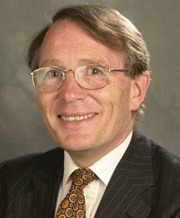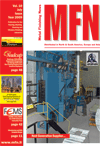E-Archive
Interview
in Vol. 10 - July Issue - Year 2009
An Important New Award: The FEMS Materials Innovation Prize

The FEMS Materials Innovation Prize

Derek Fray
At a meeting of its Executive Committee last year, FEMS gave serious consideration to the scope of its existing awards and whether they covered adequately all aspects of endeavour in the field of materials in its broadest sense. The available awards included the FEMS European Materials Medal for outstanding contributions to the field of Materials Science and Engineering, the FEMS Materials Science and Technology Prize to recognise significant contributions by young European materials scientists and Engineers (below the age of 40), and the FEMS Lecturers Awards for young European materials scientists (again below the age of 40) who have distinguished themselves by the significance of their work and their ability to communicate effectively.
It was realised that FEMS had no award for innovation in the world of materials. Therefore, immediate action was implemented to rectify this omission by founding the FEMS Materials Innovation Prize for distinguished scientists or engineers to recognise outstanding contributions to technological development and innovation in materials science and engineering.
Rules for the Materials Innovation Prize were drawn up by the FEMS Awards Selection Committee. These included the criteria to be used in selecting the prize-winner. It was agreed that particular emphasis would be placed on the quality of the contribution to the field, which would have to be exceptional with regard to the degree of innovation and market potential, as reflected in patents, licenses and other contracts between the nominee’s institute and industry, spin-offs, and both publications and invited talks. As indicators of the importance of the innovation it was agreed that the following factors would be taken into account for selecting the award recipient:
• Economic contribution;
• Environmental contribution; and
• Contribution to quality of life.
It was announced that the prize would consist of a specially-designed medal and the FEMS Secretary was charged with responsibility for coming up with something suitable. He devised the concept of incorporating a rising sun in the design since this symbolises something new each day. He put this idea to Miss Casey Rafferty, a designer based at The Institute of Materials, Minerals and Mining in London where the FEMS Office is located. She proposed five variants on this theme and, of these, the one shown below was selected by the FEMS Executive Committee at its most recent meeting in London on 30th April.
First Winner of the New Prize:
Professor Derek J. Fray
FEMS is proud to announce that the first winner of its new Materials Innovation Prize is Derek Fray, Director of Research and Emeritus Professor of Materials Chemistry in the Department of Materials Science and Metallurgy at the University of Cambridge.
Derek Fray studied Metallurgy at Imperial College, London University and went on to obtain a PhD for a thesis entitled “The Conductance of Metal Salts at Constant Volume”. He began his career as an Assistant Professor of Metallurgy at Massachusetts Institute of Technology for three years. He then returned to the UK as a Group Leader in the Research Department of Imperial Smelting Corporation at Avonmouth, Bristol. Three years later he returned to the University of Cambridge as a lecturer in the Department of Materials Science and Technology, becoming Director of Studies in Materials Science and Metallurgy, Fitzwilliam College, in 1978. He moved to the University of Leeds in 1991 as Professor of Mineral Engineering and Head of the Department of Mining and Materials Engineering. Five years later he again returned to the Department of Materials Science and Metallurgy at the University of Cambridge, as Professor of Materials Chemistry, and Head of Department from 2001 to 2006.
During his career he has published more than 300 papers and been the inventor of approximately 180 patents.
Professor Fray has many notable technical achievements, including development of the Fray-Farthing-Chen process for the production of titanium by the electro-deoxidation of solid TiO2 in molten calcium chloride. This promises to revolutionise titanium production and greatly reduce its cost compared with material produced by the traditional Kroll process which needs many large electrolytic cells for regenerating the magnesium that is used as a reducing agent.
The presentation of the award to Professor Fray will take place during the opening ceremony of EUROMAT 2009 in Glasgow on Sunday 6th September (see www.euromat2009.fems.eu).
Following the presentation, Professor Fray will give a talk entitled “Examples of Synergy Leading to Innovations in Materials Science”. This will explain that innovation is only successful when new ideas are put into practice and this requires three things: the initial idea to solve a problem; experimental results to show that it works; and, hopefully, a partner to invest in order to make it a success. The identification of the problem is the first step but rather than attempting to find an answer from first principles, which would be very time-consuming, it is constructive to consider technologies from different disciplines which may offer a faster solution to the problem. Several examples will be given and these will include:
(1) Novel anodes for lithium ion batteries deriving insight from phase diagrams and intercalculation to produce tin-filled carbon nanotubes;
(2) Inert anodes for molten salt electrowinning processes, using thermodynamics and the electronic properties of oxides, and their application to space exploration;
(3) Sensors for the detection of hydrogen in solid and liquid metals using the principles of physical metallurgy and solid state chemistry; and
(4) Wound healing by the generation of pure oxygen from air.
For Information contact:
E-mail: paul.mcintyre@iom3.org




























